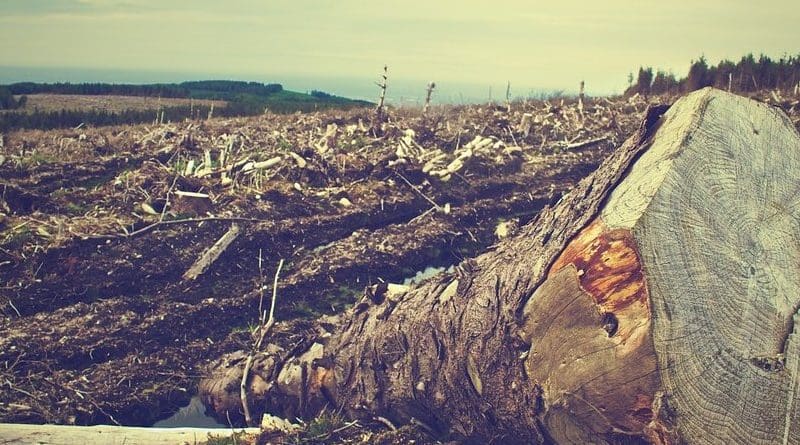Why Ending Deforestation Is So Important – OpEd
By Arab News
By Chris Doyle*
Few things are more magnificent or more full of life and vigor than the Earth’s rainforests. These extraordinary ecosystems lavish the globe with extraordinary, jaw-dropping biodiversity. They are the powerful and dynamic lungs that keep our planet alive. Even now, forests cover a third of the world’s land, but rainforest coverage is only about half of what it was in the 1960s.
In 2021, at COP26 in Glasgow, 145 of the world’s leaders, responsible for more than 90 percent of the world’s forests, entered into an agreement, sadly a nonbinding one, to halt and reverse deforestation by the end of this decade. This included a commitment to stop all illegal forestation by 2028. Given that the voluntary 2014 agreement known as the New York Declaration on Forests, which aimed to halve deforestation by 2020, failed miserably, this was at least an improvement.
This matters for climate change, as humankind’s deforestation is responsible for nearly 15 percent of total carbon dioxide emissions. Moreover, fresh research demonstrates a clear and undeniable link between deforestation and local rainfall. The clearing of lands in the Amazon and Congo basins is leading to a decline in local precipitation, affecting agriculture.
Rainforests continue to be destroyed. Since the turn of the century, the world has lost 427 million hectares of tree cover, about 11 percent of the level of cover in 2000. The annual loss of tree cover has been rising consistently since 2000, with about a third of this likely to be permanently destroyed, while the remainder could be recoverable. Various factors exacerbate this. One large element is as the result of commodity-driven practices like logging, mineral extraction and expanding agriculture.
A new report indicates that a minimum of $130 billion must be found every year just to protect the tropical rainforests most at risk. Such funds need to be combined with sizable reductions in beef and dairy consumption. Palm oil consumption also needs to drop.
The report found that a mere $2 billion to $3 billion a year is devoted to this ambition. This means there needs to be a 50-fold increase in funding. But this pales into petty cash territory when one considers that about $3.5 trillion a year of capital investment will be required on average between now and 2050 to build a net-zero global economy, up from a mere $1 trillion per annum today. Some of this will come out of a decline in investments in the fossil fuels sector.
Some countries have started to stump up a portion of the funds. US President Joe Biden last week pledged $500 million over five years to a fund to tackle deforestation in the Amazon, but this still has to be approved by Congress. Germany has announced it will double its funding for forests to €2 billion ($2.2 billion) through 2025. But others must follow suit and do more.
What else can be done? There is no cure-all panacea. Everything is so interdependent. For example, Gabon is one of the most extensively forested countries on earth, with 90 percent tree cover, but elephant poaching undermines this. Why? Because these incredible creatures play a vital role in dispersing the trees’ seeds over vast distances. Chimpanzees do much the same and they too are under threat. The Gabonese authorities have taken drastic steps, burning mountains of ivory to send a powerful anti-poaching message.
Powerful positive messaging to the global public about rainforests is also vital. The campaigns to protect them need even more dynamism. How many people are aware that more than 25 percent of our modern medicines originate from tropical forest plants? So far, we have only succeeded in making use of 1 percent of these amazing plants, so the possibilities are almost endless — but only if the forests survive.
Replanting schemes have started but they need further impetus. In 2017, Brazil, in partnership with Conservation International, initiated one of the largest replanting projects in history, with the aim of planting 73 million new trees. It is ambitious and will also provide valuable insights into the prospects of massive rainforest regeneration. Research shows that the reforestation of tropical and temperate forests could take up to 113 gigatons of carbon out of the atmosphere by 2050. However, obstacles remain, including a shortage of tree seeds, disputes over land rights and, perhaps above all, an inability to deliver at scale.
Many climate activists argue that enforcement measures are vital. Entering into nonbinding agreements does not have a strong history of success. They argue that, unless states and companies are held to account, then little will improve. Little progress has been made on this front.
Many environmental activists point to corporate complicity. Greenpeace has reported on the South Korean company Hyundai, highlighting how its heavy machinery is being used in deforestation practices in the Amazon. With the help of such advanced machinery, deforestation is accelerating, often for the purposes of gold mining. At least Brazil now has, once again, a president in Luiz Inacio Lula da Silva who is committed to ending mining on Indigenous lands.
Even those who reject the overwhelming scientific consensus regarding the destructive threat of climate change should be able to rally round attempts to halt deforestation. Protecting and nurturing this gift of nature would be a priority even if climate change were not occurring.
But the climate change science is all too overwhelming to be ignored or in any way vulnerable to the declining band of skeptics who refuse to acknowledge what is happening in front of their faces. If the world is serious about limiting global warming to 1.5 degrees Celsius, and it should be, part of the equation has to include ending and reversing deforestation.
- Chris Doyle is director of the Council for Arab-British Understanding in London. Twitter: @Doylech

